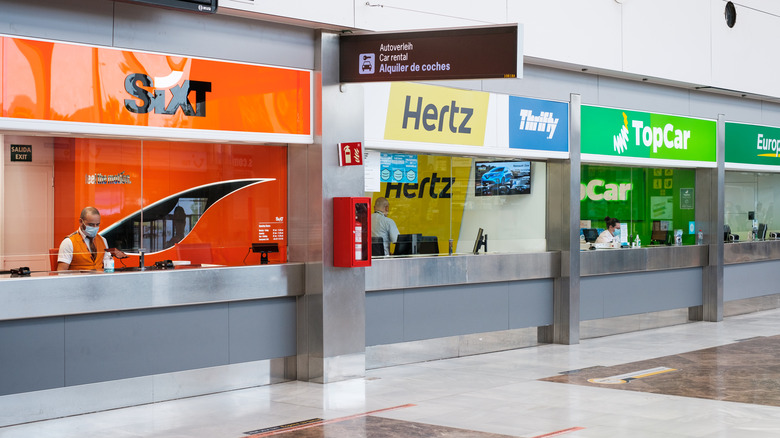You Can Probably Skip The Rental Car Insurance. Here's Why
We've all been there. You've just disembarked a long cross-country or maybe even international flight and you're at the rental car counter, anxious to leave the airport and start your vacation. Meanwhile, the counter agent is putting on a full-court press to sell you insurance for your rental vehicle, replete with scary tales of what can happen if you decline. Selling supplemental insurance is highly profitable for rental car companies and counter agents are motivated to push it by sizable commissions and/or positive commendations from their employer.
To be sure, you definitely want some type of insurance coverage when renting a car, but that coverage may already be part of your existing personal insurance policy for your owned or leased vehicle, offered as a free perk for using certain credit cards, or available for purchase less expensively through third-party providers. Doing a little homework before leaving on your next trip can yield big savings at the rental car counter and the confidence to turn down a salesperson's high-pressure pitch.
Your personal car insurance will likely suffice
A logical place to start is that if you own a car with insurance, that same plan will likely extend to covering your rental car when away from home domestically. The two major forms of insurance are loss damage waiver (LDW) which covers damage to the vehicle itself and liability insurance which covers damage to other cars, people, and property that you might impact in at-fault collision.
By the very nature of car insurance, it's virtually a given that your personal policy will have the liability component covered. Most policies, but not all, also incorporate LDW. If you're not sure, this is something that you'll want to verify with your insurance company in advance to make sure you're protected from financial exposure if the rental car is damaged or stolen.
Similarly, before relying on your personal car insurance to cover a rental, you'll want to check the deductible, which is the amount of money that you're obligated to pay out of your own pocket before funds from the insurance company kick in. The most common amount for a car insurance deductible is $500, but deductibles can range from approximately $100 up to $2,000. If your deductible falls on the higher end of that spectrum, you might want to consider the alternative options discussed below.
Many credit cards have free coverage
Many credit cards provide free rental car insurance as a perk, provided you pay for the rental using the card. Most credit cards will offer what's called secondary coverage, meaning that your personal auto insurance policy must be exhausted or unavailable before the credit card-provided insurance kicks in. However, some premium cards like the Chase Sapphire Preferred, Chase Sapphire Reserve, and Capitol One Venture X offer primary rental car coverage that needn't involve your personal auto insurance at all.
Whether primary or secondary, credit card-provided rental car coverage can be useful when traveling internationally, where your regular auto insurance may not cover you. Some countries are excluded, depending on the credit card issuer. Some common exclusions include Israel, Jamaica, and Northern Ireland, but check with your bank to be certain. Some types of vehicles may also be excluded from coverage. In the case of the Chase credit cards, pickup trucks and Teslas are not covered, among others.
Finally, credit cards frequently only cover the rental car itself, not the liability protection from injuring people or damaging other property. Rental car companies are required to provide some degree of liability protection included in the base rate of renting the car, but this amount is typically low. A combination of your personal car insurance policy to cover liability and a low or no deductible credit card policy to handle LDW can be a powerful — and free — alternative to the coverage sold by rental car companies.
Third-party vendors can save money, but may be more of a hassle
If you don't have a credit card that offers rental car coverage, there's still an option to purchase insurance from a third party that's less expensive than buying it impulsively at the rental car counter. Companies like Allianz Travel Insurance offer primary rental car coverage up to $50,000 from $11 per day, which also includes 24-hour emergency support. Other options include Bonzah, which boasts "Up to $35,000 in Primary Coverage for Just $7.99 per day" and Rental Cover, which doesn't list a specific price, but claims up to a 50% discount versus the rental car counter and easy cancellation if your plans change.
Do note that like credit card insurance, basic third-party rental car insurance only covers the rental vehicle and your possessions, not liability coverage for damage or injury to others resulting from an at-fault accident. For that, either a personal car insurance policy can be relied upon or Supplementary Liability Insurance (SLI) can sometimes be purchased at extra cost from third-party providers during online checkout. Though the cost and effort involved might begin to negate the small savings versus just purchasing coverage from the rental car company, a rare exception when that move might actually make sense.



